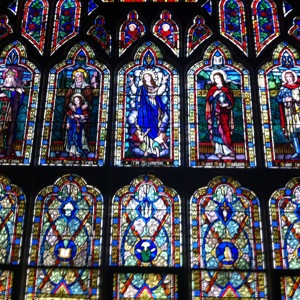 E ARE ALL CALLED TO SAINTHOOD. This may sound crazy, but I am more and more convinced it is true. We could be saints. Do be afraid of it! While it is possible that our fear may hinder us more than our weakness, but both will do nicely! Yet, God’s infinite mercy desires sainthood for us. God prods us gently and not so gently in that direction.
E ARE ALL CALLED TO SAINTHOOD. This may sound crazy, but I am more and more convinced it is true. We could be saints. Do be afraid of it! While it is possible that our fear may hinder us more than our weakness, but both will do nicely! Yet, God’s infinite mercy desires sainthood for us. God prods us gently and not so gently in that direction.
Saint Paul’s letter to the Romans beautifully states, “The Spirit comes to the aid of our weakness; for we do not know how to pray as we ought, but the Spirit himself intercedes with inexpressible groanings.”
St. Paul continues: “And the one who searches hearts knows what is the intention of the Spirit, because he intercedes for the holy ones according to God’s will.” So, it is unimportant that we become saints recognized by the Church, but rather that we do God’s will and become saints in the eyes of God.
Perhaps there is a roadmap to sainthood that we’ve known all along—one that can be found in the Beatitudes:
Blessed are the poor in spirit, for theirs is the Kingdom of heaven.
Blessed are those who mourn, for they will be comforted.
Blessed are the meek, for they will inherit the land.
Blessed are those who hunger for righteousness, for they will be satisfied.
Blessed are the merciful, for they will be shown mercy.
Blessed are the clean of heart, for they will see God.
Blessed are the peacemakers, for they will be called children of God.
Blessed are they who are persecuted for the sake of righteousness,for theirs is the kingdom of heaven.
As a path to sainthood, does this sound crazy or does this sound possible? It is possible! God is calling us to be fully human in doing His will: to show mercy to others, to have a clean heart, to hunger for righteousness. In showing mercy we will be assured of God’s mercy. The clean of heart are assured they will see God. We are called to do God’s will, and God’s will is always possible. Know this in your heart and pray always to do God’s will.
I am not suggesting this is possible because it is easy. Assuredly, it is not. In doing God’s will, we are each called to carry a cross of some kind. It may be a cross that no one else understands. But God has a purpose in our cross. Flannery O’Connor succinctly stated, “They think faith is a big electric blanket, when of course it is the cross.” Have faith our cross guides us toward sharing eternal life with God. 
I leave you now with a motet appropriate for All Saints, Palestrina’s setting of “Sicut cervus desiderat.”

ON A PERSONAL NOTE today my wife and I celebrate our tenth wedding anniversary. Speaking of sainthood, she is most definitely a candidate! She is my hero.


